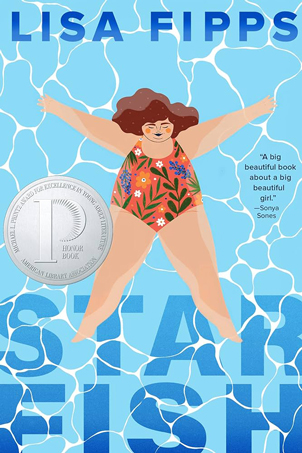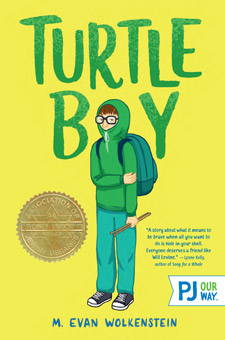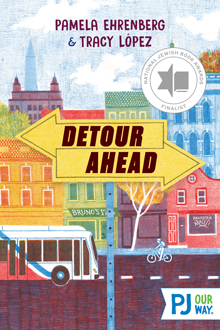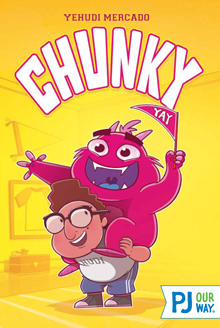Starfish
Ellie’s not unhappy because she's fat.
She’s unhappy because no one will ever let her forget it.
It's about time she did something about that.
Average Rating
( hint: Login to leave a review! )
108 Reviews
Leave Review
What the Book Is About
Jewish Content & Values
Content Advisory
What the Book Is About
This best-selling, award-winning novel in verse introduces us to eleven-year-old Ellie Hofstein. She’s not looking forward to starting 6th grade, and not just because her best friend, Viv, has moved away. Despite Ellie’s commitment to her “Fat Girl Rules” (don’t wear bright colors, make yourself as small as possible, etc.), she is still bullied relentlessly by her peers. But the bullying doesn’t end when Ellie leaves school; her brother makes rude comments and her mother is obsessed with Ellie’s weight, food intake, and the possibility of bariatric surgery - which Ellie doesn’t want.
With the help of compassionate teachers, her supportive father, a skillful therapist, and her new neighbor Catalina (a Mexican American girl who knows what it’s like to be judged by her appearance), Ellie finds her voice and the words she needs to stand up for herself. Although the story can be intense at times, readers will be cheering for Ellie by the end!
Jewish Content & Values
-
Ellie’s father is Jewish. Her siblings both identify as Jewish; in an effort to keep the family peace, Ellie identifies as interfaith.
-
Ellie uses the Yiddish word zaftig to describe what it would be like to wear clothes she likes and walk with confidence.
-
The family celebrates Shabbat, and both parents bless Ellie with the priestly blessing.
-
Ellie writes a poem about the quilt her Jewish grandmother, Bobeshi, made in celebration of the family ancestry. The quilt includes fabric from baby pajamas, a wedding gown, and a striped cotton jacket with a gold star.
-
Ellie demonstrates ometz lev, or strength of heart, when she has the courage to attend therapy and learn how to stand up for herself without bullying others.
Content Advisory
The bullying – primarily in the form of verbal abuse from Ellie’s classmates, mother, and brother – can be intense and possibly triggering for kids who struggle with body image. It does tip over into physical violence when Ellie’s peers remove the bolts from Ellie’s desk, causing it to collapse when she sits down and resulting in a minor injury. In addition, some of Ellie’s peers take her dog and refuse to give it back unless she eats an entire cake. Fortunately, Ellie is able to stand up for herself and her friends arrive to support her.
What the Book Is About
What the Book Is About
This best-selling, award-winning novel in verse introduces us to eleven-year-old Ellie Hofstein. She’s not looking forward to starting 6th grade, and not just because her best friend, Viv, has moved away. Despite Ellie’s commitment to her “Fat Girl Rules” (don’t wear bright colors, make yourself as small as possible, etc.), she is still bullied relentlessly by her peers. But the bullying doesn’t end when Ellie leaves school; her brother makes rude comments and her mother is obsessed with Ellie’s weight, food intake, and the possibility of bariatric surgery - which Ellie doesn’t want.
With the help of compassionate teachers, her supportive father, a skillful therapist, and her new neighbor Catalina (a Mexican American girl who knows what it’s like to be judged by her appearance), Ellie finds her voice and the words she needs to stand up for herself. Although the story can be intense at times, readers will be cheering for Ellie by the end!
Jewish Content & Values
Jewish Content & Values
-
Ellie’s father is Jewish. Her siblings both identify as Jewish; in an effort to keep the family peace, Ellie identifies as interfaith.
-
Ellie uses the Yiddish word zaftig to describe what it would be like to wear clothes she likes and walk with confidence.
-
The family celebrates Shabbat, and both parents bless Ellie with the priestly blessing.
-
Ellie writes a poem about the quilt her Jewish grandmother, Bobeshi, made in celebration of the family ancestry. The quilt includes fabric from baby pajamas, a wedding gown, and a striped cotton jacket with a gold star.
-
Ellie demonstrates ometz lev, or strength of heart, when she has the courage to attend therapy and learn how to stand up for herself without bullying others.
Content Advisory
Content Advisory
The bullying – primarily in the form of verbal abuse from Ellie’s classmates, mother, and brother – can be intense and possibly triggering for kids who struggle with body image. It does tip over into physical violence when Ellie’s peers remove the bolts from Ellie’s desk, causing it to collapse when she sits down and resulting in a minor injury. In addition, some of Ellie’s peers take her dog and refuse to give it back unless she eats an entire cake. Fortunately, Ellie is able to stand up for herself and her friends arrive to support her.




